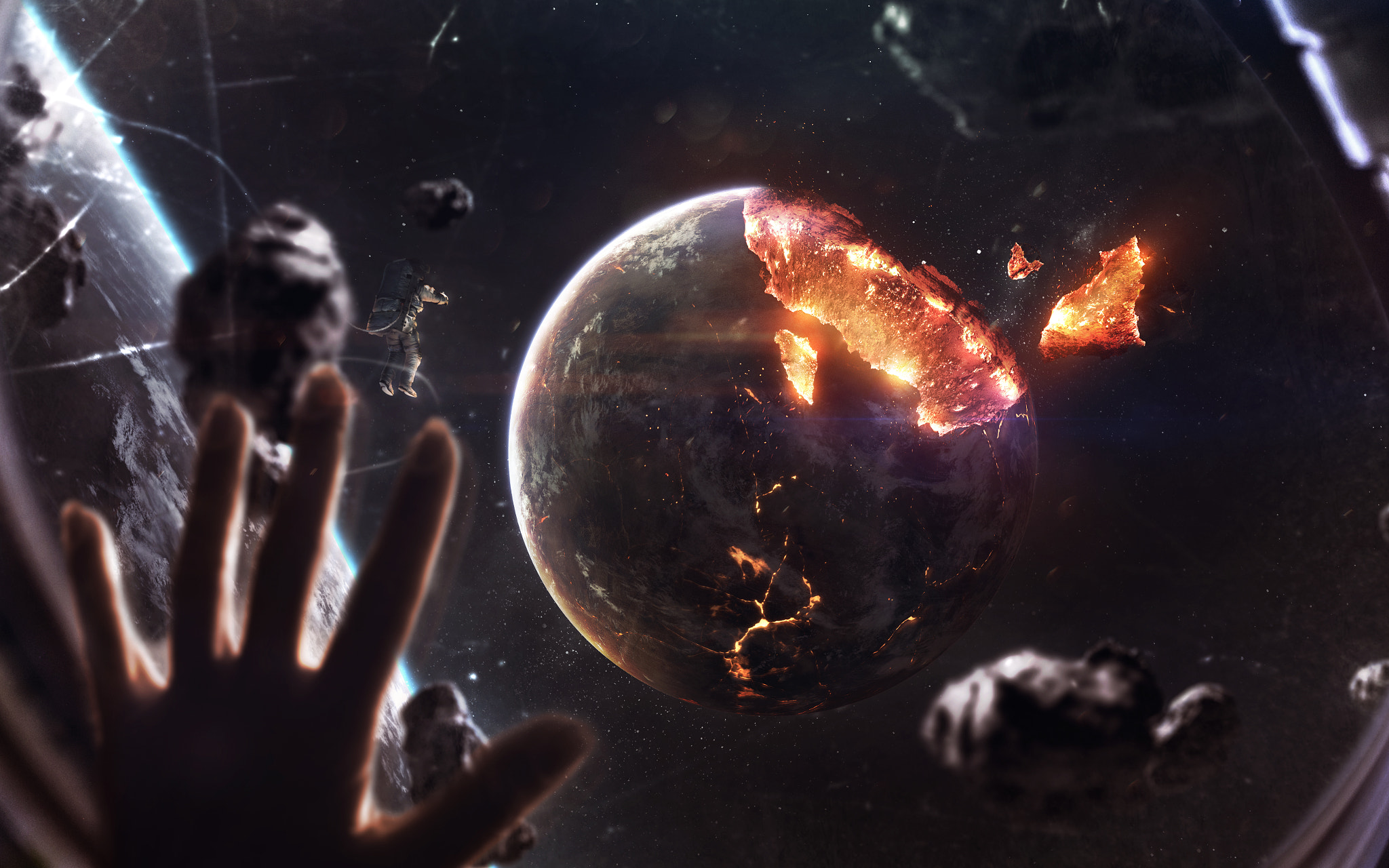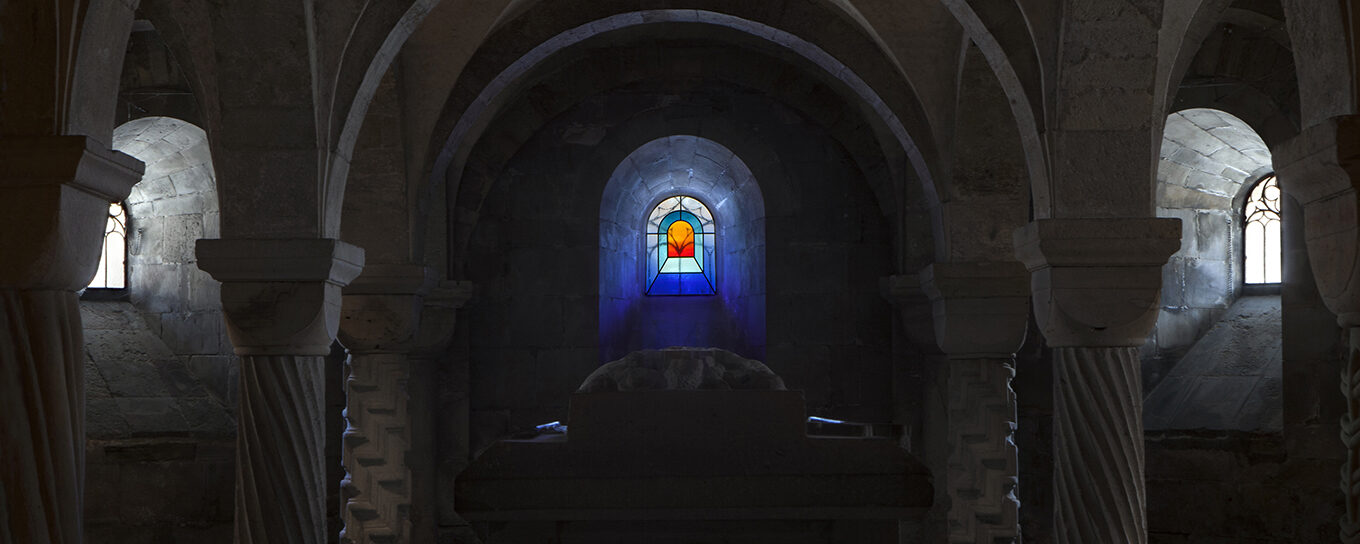
At the End of the World Newsletter – 15 September 2024
 |
This is the seventh newsletter for the At the End of the World research program, housed at Lund University. It is the third from our second year of activity. If you’re receiving this email, it’s because you’ve been subscribed to our mailing list. Below, we’ll fill you in on some upcoming events for the fall of 2024, and also what we've been up to since the last newsletter. |
-------------------------------------------------------------------------------------------------
Recent Publications |
Read Jayne Svenungsson's latest article, "From Apocalyptic Demonization to Theological Responsibility," in the journal Streit-Kultur, here: "The frequent allusions to age‑old images of doomsday scenarios testify to how apocalypticism, for better or worse, has never gone away from societies rooted in the biblical tradition. Although apocalyptic visions of a coming glory have sometimes served to give people hope and strength in difficult times, there is also a darker side to apocalypticism. From its ancient roots to its contemporary manifestations, the apocalyptic imaginary carries with it a dualism of good vesus evil that encourages idealization of one’s own community and demonization of the other." .......................................................................................................................................………………….. Together with Rosanna Farbøl and Iben Bjørnsson, Marie Cronqvist recently published the article "Cold War Conduct: Knowledge Transfer, Psychological Defence, and Media Preparedness in Denmark between Sweden, Norway, and NATO, 1954–1967” with the Scandinavian Journal of History: "Employing the Foucauldian term ‘conduct’, this article explores how social resilience and morale became a target of state intervention in Denmark during the Cold War. ‘Psychological defence’ was a Cold War phenomenon designed to bring an imagined future war into a space of control as well as a tool for the authorities’ exercise of power in case another world war became a reality. Advocating a methodological internationalism, the article analyses how the concept of psychological defence travelled from Sweden to Denmark via Norway and NATO, and in a complex process of translation, mixing and hybridization was adapted and appropriated to Danish security policy conditions, preparedness culture, and historical experiences. . ." See also here for Cronqvist's interesting essy and Understreckare on "Hesa Fredrik" in Svenska Dagbladet. .......................................................................................................................................………………….. Amanda Lagerkvist's article, "Yearning for a You: Faith, doubt and relational expectancy in existential communication with chatbots in a world on edge" published with MedieKultur: Journal of media and communication research can be found here: “In a troubled world, the launch of ChatGPT generated both cultural hopes and eschatological fears. It also reactivated the classic question of whether a “someone” is “at home” in the model, or why people act toward machines as if they are persons. This experimental essay reopens that question, arguing that the strong drive to establish “pan-relations” is not solely due to deceit; through relational expectancy, an I is yearning for a Thou in communication with the chatbot. This is shown in chatbot interactions among AI professionals who “believe” in the thrust of the model (and in AGI) pitted against first encounters among existential pundits who are more “doubtful”. Subjecting the model to an “existential test”, harnessing Jaspers’ definition of existential communication as containing risk and deferral, the article concludes that, because of what it lacks – a someone – it reminds us of what is of paramount importance in any vibrant future of human communication.” .......................................................................................................................................………………….. Tormod Johansen has published the chapter, "Legal Form and the End of Law: Pashukanis's Legacy" in Law Beyond the Legal Form: Pashukanis's Legacy, edited by Cosmin Cercel, Gian-Giacomo Fusco, and Przemyslaw Tacik (available on October 14): “This book offers new, deeper and more general, ways in which the concept of legal form can be used to push forward Marxist – post-Marxist or hauntingly Marxist – legal theory. Accordingly, this book does not pledge allegiance to reconstructing and reconsidering the official interpretative legacy of the legal form. Instead, it mobilises the revolutionary conceptual potentialities that this term contains. When investigated thoroughly, and in many dimensions, the legal form becomes a privileged vantage point not only into the greatest law-related riddles of Marxism (such as the relation between economy and the state or withering away of statal apparatuses), but the whole of modernity as the epoch determined by – if not overlapping with – capitalism. This book aims to think with the legal form rather than explain this concept. In so doing, it offers a panoply of theoretical perspectives that address legal subjectivity, abstraction, autonomy of the law and, last but not least, withering away of the law.” .......................................................................................................................................………………….. In a recent article, "Becoming What We Know: Franz von Baader on Cognition and Revelation" with the journal Philosophy, Theology and the Sciences, Mårten Björk explores "the Bavarian physician, mining engineer, and Catholic romantic philosopher Franz von Baader's (1765-1841) enigmatic claim that we think because we are thought with the help of the moral theologian Servain Pinckaers OP (1925-2008) and the psychologist Mihaly Csikszentmihalyi (1934-2021)." The article can be found here. .......................................................................................................................................………………….. Aaron Goldman has posted "Wrestling with Trump: Kayfabe and its Broader Applications" on the Religion in Praxis-blog: "What does Trump’s participation in the wrestling ring have to do with his politics? Throughout his presidential campaigns, Trump’s political style has drawn from his almost 30 years of work with WWE, the media company responsible for most of North America’s televised professional wrestling spectacle. Though each has a subtly different take on the matter, journalists and academics have argued that Trump’s politics, perhaps even his successful presidential run, are indebted to the theatrics of WWE, including journalist Judd Legum, performance theorist Sharon Mazer, political and media scholar Shannon Bow O’Brien, and political scientist David S. Moon. . ." A follow-up post can be found here, and an interview with Goldman on the same topic, here. |
--------------------------------------------------------------------------------------------
 |
Webinar iv: Surviving the Apocalypse - 16:00-17:30, 10 October 2024https://lu-se.zoom.us/j/65667016322 For the fifth webinar of the At the End of the World research program, the researchers Mia-Marie Hammarlin and Torbjörn Gustafsson Chorell will host invited guest S. D. Chrostowska for a conversation about her book Utopia in the Age of Survival: Between Myth and Politics. The book makes the case that critical social theory needs to reinstate utopia as a speculative myth. At the same time the left must reassume utopia as an action-guiding hypothesis—that is, as something still possible. S.D. Chrostowska is Professor of Humanities and Social & Political Thought at York University. She is the author of Literature on Trial: The Emergence of Critical Discourse in Germany, Poland, and Russia, 1700-1800 (2012), among other titles. |
 |
Seminar: "Post-Apocalyptic Space Imaginaries" with Johan Lagerkvist, Erik Persson & Sandra Siljeström26 November 16:15–19:00, 2024, LUX-building room C126, Lund. Invited speakers Johan Lagerkvist (Stockholm University), Erik Persson (Lund University) & Sandra Siljeström(RISE Research Institute of Sweden). Chair: David Dunér. "There are advanced, concrete plans to establish space stations on the Moon and Mars, and to set up mining industries on asteroids and other celestial bodies. Countries new to the space race, as well as private industry, are now competing to achieve these goals. Meantime, deadly asteroids travel at high speed straight towards Earth, and an accelerating climate and ecological crisis might soon make Earth uninhabitable. The dream of future human life on other planets clearly connects to apocalyptic and post-apocalyptic traditions. If life on Earth perishes in a global cataclysm, humanity could survive, one hopes, in a post-apocalyptic civilization on another planet." |
--------------------------------------------------------------------------------------------
Other Upcoming Events of Interest |
Seminar:"Politics and Immersive Performance Art near the End of All Things": 09:00-10:00, Sept 18, 2024. Old Bishops House, Biskopsgatan 1, Lund. This exciting seminar that explores the intersections of politics and art, featuring a short presentation by Matthew Paterson, Professor of International Politics at Manchester University, titled The End of the Fossil Era: Collapse or Transformation? Paterson will delve into the political and economic futures that are envisioned as we face the decline of fossil fuel dominance. The seminar will also feature a short presentation by Max Liljefors, who will discuss Aesthetics as Hope in Apocalyptic Imaginaries. Liljefors will explore the growing trend in performance art to address the perceived threat of human-induced ecological collapse, arguing that art and aesthetics offer a deeper, more genuine way of relating to the world than technological solutions. It examines the theoretical foundations, methods, and expressions of performance artists like Sisters Hope, Gylleboverket, Linda Lapina, and Steinunn Knúts Önnudóttir, who use immersive, ritualistic performances to counter the alienation of contemporary society and offer hope amid crisis. Participants:
|
Lecture by Ervik Cejvan: "Apocalyptic Imaginary and Truth" 16.00-18.00, 24 September 2024, in room B429 in the LUX-building (Helgonavägen 3, Lund), organized by the At the End of the World research program. Presentation by Patrik Fridlund: "Att förstå konspirationsteorier i politiken" together with Richard Andersson, 10:05–10:20, 29 Sept. 2024 at "Bokmässan", Gothenburg. Lecture by Tobias Hägerland: "Det stora Babylon: Romarriket i Uppenbarelseboken" 17.30-19.30, 1 Oct. 2024. The lecture is a part of the lectureseries "Vi tänker på romarriket" organized by the Faculty of Humanities, University of Gothenburg, at Göteborgs stadsbibliotek. Lecture by Tobias Hägerland: "Apokalypsbegreppet i kristendomen" at the seminar "Perspektiv på undergången", organized by Göteborgs konstmuseum in relation to the exhibition Tidens slut. Undergångskonst från Dürer till AI, Göteborg 7 October 2024. Further details TBA. Lecture by Jayne Svenungsson: "Political Theologies at the End of the World"; Distinguished lecture, 22 Oct. 18:00–20:00, at CAPAS, Heidelberg, "The idea that the world is coming to an end has never been far away in cultures rooted in the biblical tradition. In a longue durée perspective, the sense that the end is drawing near seems to have been the rule rather than the exception. Yet it is difficult to deny that the past decades have been particularly ripe of events that seem to herald the end. This heightened sense of urgency is reflected in the notion of ‘polycrisis’, which is regularly invoked today to describe how the world’s most pressing challenges – wealth discrepancies, armed conflicts, climate extremes, energy shortages, pandemics, mass migration, rising authoritarianism, global webs of exploitation, and so on – are intersecting and overlapping in ways that mutually exacerbate each other’s effects. If it is true that our times are facing challenges of apocalyptic proportions, what should be the proper philosophical response the situation? This lecture will address this question in dialogue with some leading political theologians and philosophers of our time." |
 |
Symposium with Lena Liepe, Max Liljefors, Jayne Svenungsson"Att skapa Hopp" 13.30, 20 Nov. 2024, Domkyrkoforum/Domkyrkan, Lund. This symposium is an exploration of recently published volume, "Att skapa Hopp: Ett nytt konstglasfönster för Lunds domkyrka", on the visual aspects of eschatological hope in relation to a new stained-glass window in the Cathedral of Lund. Liepe, Liljefors and Svenungsson contributed to the volume, and will present their research during this symposium. |
Apocalyptica: experiences of apocalypse and post-apocalypse as they unsettle the past, present, and futureOur partner, the Käte Hamburger Centre for Apocalyptic and Post-Apocalyptic Studies at Heidelberg University (CAPAS), publishes Apocalyptica: an interdisciplinary, international, open-access, double blind peer-reviewed journal. The journal, published biannually, explores the many competing sides of apocalyptic thinking in order to investigate the (post-)apocalyptic imaginary and to examine experiences of apocalypse and post-apocalypse as they unsettle the past, present, and future. Visit here for more information, call for papers and access to the latest issues. |
--------------------------------------------------------------------------------------------
Program websiteAs a reminder, the program’s website is located at https://www.endoftheworld.lu.se/. The website will also log each of these newsletters |
